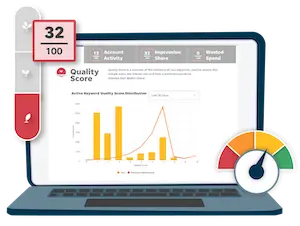
2021 Update: RIP Expanded Tex Ads 🙁
The day of reckoning is fast-approaching, people: On January 31, Expanded Text Ads become the only text ads.
If you’ve been putting off switching to Expanded Text Ads, or ETA’s, stop! There’s no more time to waste. And in today’s post, I’ll prove how important it is for you to adopt ETA’s ASAP in five nifty graphs.
Expanded Text Ad Chart #1: The Percentage of Accounts with at Least 1 ETA’s is Increasing…
The fact that the percentage of AdWords accounts with at least one Expanded Text Ad has increased from September to January shouldn’t come as a shock. They’ve been covered ad nauseam on our blog and others, and for a good reason: they represent a major shift in how advertisers write copy.
While Google has made changes to the SERP before (experimenting with the color of ad labels, killing off side ads, and countless other tweaks), none have been as impactful as ETA’s, which effectively double character count.
After more than a decade of truncating value propositions and settling for lackluster “[verb] now!” CTAs— “call now,” “buy now,” “try now”, etc.— you can finally flex your copywriting muscles. This is valuable for two reasons: with more characters, you have more space to allure customers and convey your brand’s personality.
Dominating the SERP is all about standing out from your competition. Believe it or not, this can be extremely difficult when every paid ad is forced to leverage slight variations on the same message. While bidding on the right keywords (showing up on the right SERPs) is half the battle, standing out from the other guys (and the organic listings) requires irresistible headlines and quippy body copy.
“But Allen, won’t everybody be doing that?”
No.
First of all, the increased space means less opportunity for overlap. Second, as you’ll see in chart #5, more than 30% of advertisers in most industries aren’t even using Expanded Text Ads yet. Get the upper hand while your competition lags behind: write great ads!
TL;DR
Choppy value props and played out CTA’s are dead. “Buy Now!” is a thing of the past, but only 70% of advertisers know it.
Expanded Text Ad Chart #2: …BUT the Percentage of ETA’s in Relation to All Text Ads is Decreasing
This one hurts.
Despite the fact that the majority of advertisers surveyed have tried ETA’s, less than 40% of active ads in accounts we’ve graded are ETA’s. Stranger still is the fact that from December to January, the number of ETA’s fell.
Given the looming deadline this seems counterintuitive, right? I mean, why would advertisers write new STA (crusty ol’ 90-character text ads) or delete ETA’s that are hot off the presses?
This could be the result of a few things, but possible explanations are:
- ETA are tough to write. Maybe some advertisers gave them a shot in November and December but were intimidated by the prospect of writing tens (if not hundreds) of new ads, so they reverted to STA.
- The dip could simply represent reversion to tried and true post-holiday ad copy. Many B2B outfits see a surge in business after the new year (resolutions, business edition), and instead of writing new ads after the slow holiday, they rotated in some vintage copy.
- People forgot about the January 31 deadline and decided to shelf ETA’s because there isn’t enough time in the week to write an account’s worth of captivating ad copy (these folks should have heeded our advice in July!)
- Some advertisers noticed a dip in CTR because fresh ETA’s lack the clout (read: preferential treatment) that comes with historical data (more on this to come) and ran for the hills.
TL;DR
Two weeks in, 2017 doesn’t think very highly of ETA’s.
Expanded Text Ad Chart #3: Advertisers Typically See CTR Gains from ETA’s
The curious dip in ETA’s volume from December to January is startling because, frankly, our data says that ETA’s work. In fact, we’ve noticed some pretty substantial increases (a median CTR increase of 28%), with some advertisers seeing much bigger gains.
Now, these improvements are by no means universal. In fact, while our aggregated Grader data supports the assertion, our own AdWords account did not see big gains from ETA’s (at least not at first).
According to Senior Marketing Specialist Brett McHale (the man behind our PPC and paid social accounts), “It took about three weeks for our ETA’s to begin performing as well as our standard text ads, and even then, the CTR was lower than we’d seen in some of our older ads. What has improved, though, is the conversion rate. It’s as if the prospects who actually click the ads are more qualified.”
Brett went on to mention that Expanded Text Ad CTRs have normalized and, in some ad groups, improved, after testing. When I asked him what he attributed the improvement to, Brett told me that the change was “a result of understanding that most people only read the headlines. You’ve got to make them count.”
How do you go about maximizing the 58% increase in headline space available with Expanded Text Ads?
Don’t just re-use copy from your old ads: completely rethink how you write them.
TL;DR
The secret to killer ETA’s? Make that second headline completely irresistible.
Expanded Text Ad Chart #4: ETA’s Are the Key to Better Bing CTRs
BING HAS ETA, TOO!
And guess what, people? They work.
As you can see, with standard text ads CTR was slightly higher on Bing than it was on AdWords. This trend continues (and then some) with Expanded Text Ads.
TL;DR
Those older, wealthier demographics love long(er) form copy: Once you’ve created ETA’s on AdWords, don’t forget to migrate them over to Bing.
Expanded Text Ad Chart #5: In Most Industries, More Than 30% of Advertisers Still Haven’t Adopted ETA’s
Brace yourselves …
As I’m writing this post we’re about two weeks away from ETA-takeover. Two. Weeks. And more than 30% of advertisers in every industry don’t have a single ETA’s in their account.
Look at the graph above and find your industry. Notice that the science, jobs & education, and finance sectors have the highest adoption rates (conversely, books & literature food & drink, and beauty & fitness have the lowest adoption rates. Now, odds are, based on the fact you’re reading this blog post, you probably live somewhere on one of those blue bars. Congrats!
If you find yourself in this minority however, don’t panic just yet. Be aware that the deadline looms large and prepare yourself by checking out our Countdown to ETA’s webinar featuring Mark Irvine (or any of the blog posts I’ve linked to, for that matter)!
TL;DR
Don’t recycle copy that’s worked in the past: use the extra characters to give your ads character.
Have you made the switch over to ETA’s yet? We’d love to hear about your successes (and struggles).
Data Sources
The data in graphs 1, 2, and 5 is based on approximately 15,507 AdWords Grader runs performed by SMB accounts across all verticals, advertising worldwide, on the Google Search Network between 9/15/2016 and 1/3/2017.
The data in graph 3 is based on a sample size of 11 accounts (WordStream clients) using Expanded Text Ads on the Google Search Network in June 2016.
The data in graph 4 is based on a sample of 15 WordStream client accounts with early access to Bing’s Expanded Text Ads who were advertising on both the Google Search Network and the Bing Search Network in October 2016.













